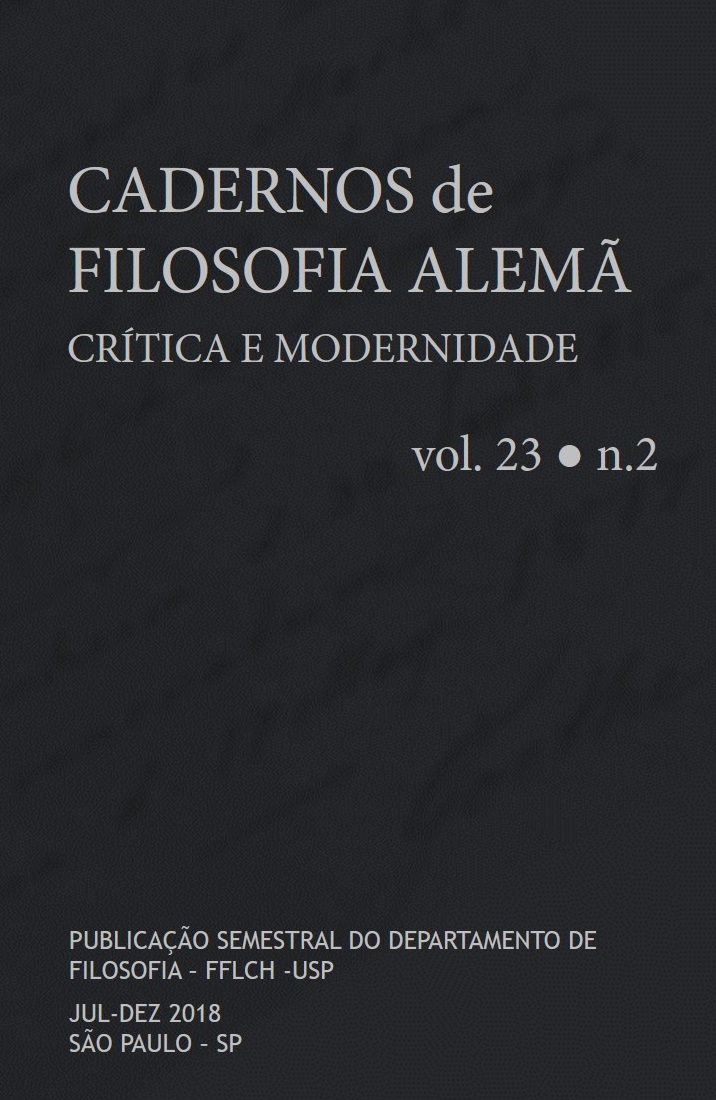The problem of substance in Hegel’s Doctrine of Essence (1813)
DOI:
https://doi.org/10.11606/issn.2318-9800.v23i2p81-104Keywords:
substance, accident, relation, refutation, SpinozaAbstract
The aim of this article is to clarify the way in which Hegel’s Doctrine of Essence (1813) develops a critical presentation of the category of substance. To this end, I will proceed in three steps. In the first place, I will present the relational character of substance in the relevant place of the Doctrine of Essence (1813); in the second place, I will analyze the shortcoming which drives the logical science beyond the relation of substantiality; in the third place, I will make a few comments on the general sense of Hegel’s refutation of Spinoza’s system.
Downloads
References
Chauí, M. (1999). A nervura do real. Imanência e liberdade em Espinosa. São Paulo, SP: Companhia das Letras.
Cirulli, F. (2006). Hegel’s Critique of Essence. A Reading of the Wesenslogik. New York & London: Routledge.
Emundts, D. (2018). „Die Lehre vom Wesen. Dritter Abschnitt. Die Wirklichkeit“. In: Quante, M. & Mooren, N. (orgs.) Kommentar zu Hegels Wissenschaft der Logik. Hegel-Studien. Beiheft 67. Hamburg: Meiner.
Ferrarin, A. (2001). Hegel and Aristotle. Cambridge, USA: Cambridge University Press.
Giuspoli, P. (2000). Verso la Scienza della logica. Le lezioni di Hegel a Norimberga. Trento (Itália): Verifiche.
Hagen, H. (2016). „Die Logik der Wirklichkeit: eine Entwicklung vom Absoluten bis zur Wechselwirkung“. In: Arndt, A. & Kruck, G. (orgs.) Hegels Lehre vom Wesen. Berlin: De Gruyter.
Hanke, T. (2016). „Das Wesen im Begriff. Über den Zusammenhang von objektiver und subjektiver Logik in der Passage ‚Vom Begriff im allgemeinen‘“. In: Arndt, A. & Kruck, G. (orgs.) Hegels Lehre vom Wesen. Berlin: De Gruyter.
Hegel, G.W.F. (1969). Werke in zwanzig Bänden (abreviação = TW). Moldenhauer E., Michel, K.M. (orgs.). Phänomenologie des Geistes. Band 3. Frankfurt am Main: Suhrkamp.
____________. (2017). Ciência da Lógica, 2. Doutrina da Essência. Tradução de C. Iber e F. Orsini. Petrópolis, RJ: Editora Vozes.
Henrich, D. (1978). Hegels Logik der Reflexion. Neue Fassung. Hegel-Studien, Beiheft 18, pp. 203-324.
Hösle, V. (1988). Hegels System. Band I: Systementwicklung und Logik. Hamburg: Meiner Verlag.
Houlgate, S. (1995). Necessity and Contingency in Hegel’s Science of Logic. The Owl of Minerva, 27(1), pp.37-49.
____________. (2000). “Substance, Causality, and the Question of Method in Hegel’s Science of Logic”. In: Sally Sedgwick (ed.). The Reception of Kant’s Critical Philosophy. Cambridge (USA): Cambridge University Press.
Iber, C. (1990). Metaphysik absoluter Relationalität. Eine Studie zu den beiden ersten Kapiteln von Hegels Wesenslogik. Berlin/New York: Walter de Gruyter.
____________. (2003) „Übergang zum Begriff. Rekonstruktion und Überführung von Substantialität, Kausalität und Wechselwirkung in die Verhältnisweise des Begriffs“. In: Koch, A.F. & Oberauer, A. & Utz. K. (orgs.). Der Begriff als die Wahrheit. Zum Anspruch der Hegelschen ‚Subjektiven Logik‘. Paderborn: Schöningh.
Longuenesse, B. (2007). Hegel and the Critique of Metaphysics. Translated by Nicole J. Simek. Cambridge (USA): Cambridge University Press.
Macherey, P. (1979). Hegel ou Spinoza. Paris: Vrin.
Melamed, Y. (2012). “‘Omnis determinatio est negatio’ – Determination, Negation and Self-negation in Spinoza, Kant and Hegel”. In: Förster E. & Melamed, Y. (eds.). Spinoza and German Idealism. Cambridge (USA): Cambridge University Press.
Morfino, V. (2008). Causa sui or Wechselwirkung: Engels between Spinoza and Hegel. Historical Materialism 16, pp.9-35.
Nunziante, A. (2001). Monade e contraddizione. L’interpretazione hegeliana di Leibniz. Trento, Itália: Verifiche.
Schick, F. (1994). Hegels Wissenschaft der Logik – metaphysische Letztbegründung oder Theorie logischer Formen? Freiburg/München: Karl Alber Verlag.
Stern, R. (2016) “Determination is Negation”: The Adventures of a Doctrine from Spinoza to Hegel to the British Idealists. Hegel Bulletin, 37, pp. 29-52.
Downloads
Published
Issue
Section
License
Information and conceptions on the texts are complete responsibility of the authors.
All the articles submitted before July 5th 2018 and those published after July 2021 are licensed under a CC BY-NC-ND license – except those published between the aforementioned dates, which are under the CC BY-NC-SA license. The permission for the translation of the material published under the license CC BY-NC-ND by third parts can be obtained with the consent of the author.
Open access policies - Diadorim
Rules applied before July 5th 2018:
Presenting a submission to our Editorial Board implies granting priority of publication for “Cadernos de filosofia alemã”, as well as transferring the copyright of texts (once published), which will be reproduced only with the manifest authorization of the editors. Authors keep the right to reuse the texts published in future editions of their work, without paying any fees to "Cadernos”. We will not grant the permission to re-edit or translate the texts for third parts without agreement of the author.


